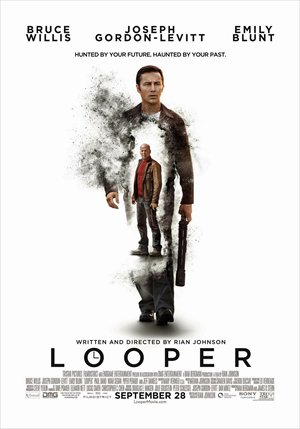Hasta la vista, maybe?

It has been two weeks since science fiction action blockbuster Looper (2012) hit Chinese cinemas on September 28. As the sole Hollywood epic screened domestically during the eight-day Golden Week holiday, Looper raked in more than 130 million yuan ($20.75 million).
Not surprisingly, the film's main appeal is its time travel-rich storyline - something supposedly mastered in 2074 and exploited by criminal gangs eager to eradicate enemies. Mobs send hired assassins, or "loopers," to the past to kill marked men. Young Joe (Joseph Gordon-Levitt), bumps into his older self (Bruce Willis), who is sent back in time to 2044 to kill a man known as the Rainmaker, who is destined to kill his wife.
Confusing? Maybe. Appealing to Chinese audiences starved of time travel movies by the State Administration of Radio, Film and Television (SARFT)? You bet.
Time travel ranks among the most popular themes in Western science fiction, with hit Hollywood films The Terminator (1984), Back to the Future (1985) and 12 Monkeys (1995) all serving as testament to American cinemagoers' love affair with the genre. Lesser known is that Chinese fiction has also been a cradle for time travel tales. Even today it remains especially popular, despite the time travel ban for TV and film productions from SARFT that was imposed in April last year.
A search using the Chinese term for time travel, chuanyue, on qidian.com, China's largest online literature portal, yields 74,000 results. Novelist Tong Hua's debut story Startling by Each Step (2005) about a modern young woman who travels back to the Qing Dynasty (1644-1911) and fascinates princes was adopted into TV series Scarlet Heart before the restrictions were introduced and was easily 2011's most discussed TV drama.
Chinese time travel fiction usually follows a similar plot that involves protagonists traveling back to past and showing off their knowledge of 21st century history, literature, art and science to win the heart of their lover, who is invariably a well-known historical figure.
Shen Lin, a 21-year-old college student, told Metro Beijing she enjoys reading time travel literature, which isn't prohibited, as it offers an escape from the pressures of modern life. "Many people have historical figures they revere, but no chance to meet them. Time travel stories give readers a chance to at least imagine what it would be like," said Shen.
However, some sci-fi fans find the concept of time travel being used as a means to discover romance or adventure involving historical figures shallow.
Hollywood's plots offer insight into the limitless possibilities of time travel, such as traveling into the future or battling cyborg assassins intent on killing you, they will tell you. China's time travel stories, by contrast, appear stuck in the past.
Professor Wu Yan, a science fiction writer and China's only master tutor of science fiction at Beijing Normal University, told Metro Beijing that most Chinese audiences are familiar with their country's history that, with 5,000 years to draw upon, is a fertile ground for many stories.
"Traveling back in time allows authors to tap into an already available scenario rich in real-life figures, which appeals to history lovers. Exploring an unpredictable future, on the other hand, is somewhat risky," Wu said.
The lack of Chinese time travel stories involving forays into the future shouldn't be seen as a reflection of the lack of creativity in domestic literature, Wu said. "Depicting a future society also requires anticipating changes in social structures, which forces writers to confront politics. This part is troublesome."
Wang Yao, a Beijing-based science fiction writer, said an important part of time travel stories is placing characters in historical events that have the potential to change the course of history - an element that can barely be found in Chinese time travel stories.
"Most of these stories involve protagonists traveling to a fictional time, which allows time travelers to romance celebrities," said Wang. "China's addiction to the past in time travel literature actually reflects people's desire to escape reality."